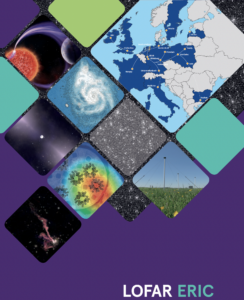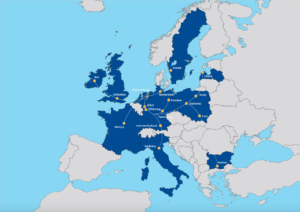The European Commission approved the establishment of LOFAR ERIC (European Research Infrastructure Consortium), in which Bulgaria is a full founding member. The main task of LOFAR ERIC is to provide the European astronomical community with a coordinated exploitation of LOFAR (Low Frequency Array), the world’s largest radio telescope at low frequencies below 250 MHz. The LOFAR ERIC aims to position LOFAR as a world-leading research infrastructure that will, in the long term, maintain global leadership positions in radio astronomy.
LOFAR is an extremely versatile modern radio telescope that can be used to observe the most ancient stars and galaxies as well as our Sun and the dynamics of the Earth’s ionosphere. In essence, it is a pan-European infrastructure for low-frequency radio astronomy observations with antenna stations located in 8 European countries (by 2021). These long international baselines are essential to ensure LOFAR’s high angular resolution which will remain unique for these low frequencies at least within the next decade. The LOFAR-BG site planned for construction in Bulgaria in the National Roadmap for Research Infrastructure (2020-2027) will be the southernmost and easternmost facility of the telescope – a new and the only antenna station to date in South-East Europe.
The world’s most powerful radio telescope will serve the needs of the research community for at least this decade ensuring through LOFAR ERIC the continued operation and provision of scientific services to users as well as further technical developments. It will help to bring the European research community together to maximise the scientific outputs of the powerful and universal LOFAR infrastructure.
LOFAR ERIC will bring together radio and software engineers, IT experts and astronomers in a cross-disciplinary international collaboration and offer opportunities to the European research community that are not available elsewhere in the world. This will provide enormous advantages for European researchers from both a scientific and technical perspective. It will also help scientists on the Old Continent to maintain a leading research position with regard to the Square Kilometre Array, or SKA, a global telescope in Australia and South Africa scheduled to begin operations later this decade.








